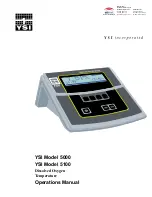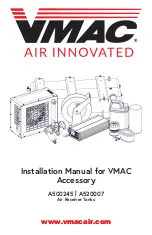
Speedrooter 91™
Cable Application Chart (Table 1)
Cable Size
Pipe Size
Typical Applications
3/4”
(Large Drum)
4” to 10”
Large Drains, Long Runs,
Roots
5/8”
(Large Drum)
3” to 6”
Floor Drains, Roots
1/2”
(Small Drum)
2” to 4”
Stacks & Small Drains
(No Roots)
5
1.
Place machine at a
distance not greater
than two feet from the
drain opening. Be
sure the Speedrooter
Guide Tube (S91-GT)
is in place. If you
can't get the machine
this close to the drain
opening, run the cable
through the optional Guide Tube Extension (GTE) or
a metal guide tube to prevent cable whipping.
2.
Position the air foot pedal for easy accessibility. The
machine is designed for one-person operation. Be
sure you can quickly remove your foot from the pedal
in an emergency.
3. Lock the wheels by lifting the brake handle located
next to the left wheel and pressing it into the clip.
4. Be sure the motor switch is in the
off
position.
5. Make sure the Power Cable Feed is set to match the
cable size you have selected. If you’re using 3/4" or
5/8” cables, the feed should be assembled with the
raised side of the lower two caps outward. If you are
using 1/2" cables, the feed should be assembled with
the raised side of the caps inward.
6. Select the proper cutting tool (See Cutter Application
Chart—Table 2). A good tool to start with is the
Spearhead or 2” U-Cutter. If you are having difficulty
getting around a P-Trap or close bend, try the flexible
leader. After the line has been opened, follow with
larger blades, which scrape the inside edges of the
pipe, assuring a real cleaning job.
7. Insert the cutter into the female connector at the end
of the cable and tighten the connecting screw and
lock washer
firmly
in place.
MAKE SURE THE MOTOR SWITCH IS IN
THE „OFF‟ POSITION!
OPERATION
SET-UP
Feed Control Lever
Feed Pressure Knob
Reverse
Neutral
Forward
POWER CABLE FEED
Cutter Application Chart (Table 2)
Cutter
Cat. #
Typical Applications
Cutters for 1/2” Cables
Arrow
Head
AH
Starting Tool, ideal for
cutting and scraping.
1-1/2”
U-Cutter
1-1/2UC Finishing tool, works well
in grease stoppages.
Small
Retrieving
Tool
RTR-1 To remove or retrieve
loose objects.
13” Flexible Leader
LE-1
Tool for negotiating
around difficult bends.
Cutters for 5/8” and 3/4” Cables
Spear
Head
SHD
Starting Drill—gets water
flowing.
2”
U-Cutter
2UC
For Cutting and Scraping
3” & 4”
Side
Cutter
Blades
3SCB
&
4SCB
For Cutting—Scraping
walls of pipe.
3” Heavy
Duty Saw
Blade
3HDB
For Cutting Roots
4” Rotary
Saw Blade
4RSB
For Cutting Roots
Large
Retrieving
Tool
RTR-2 For removing loose ob-
jects or broken cables.
26” Flexible Leader
LE-3
Helps cable get through
tight traps and bends.
Note: There are no fixed rules for what cutter to use. If
one tool doesn’t take care of a stoppage, simply try
another.
Raised Cap


































